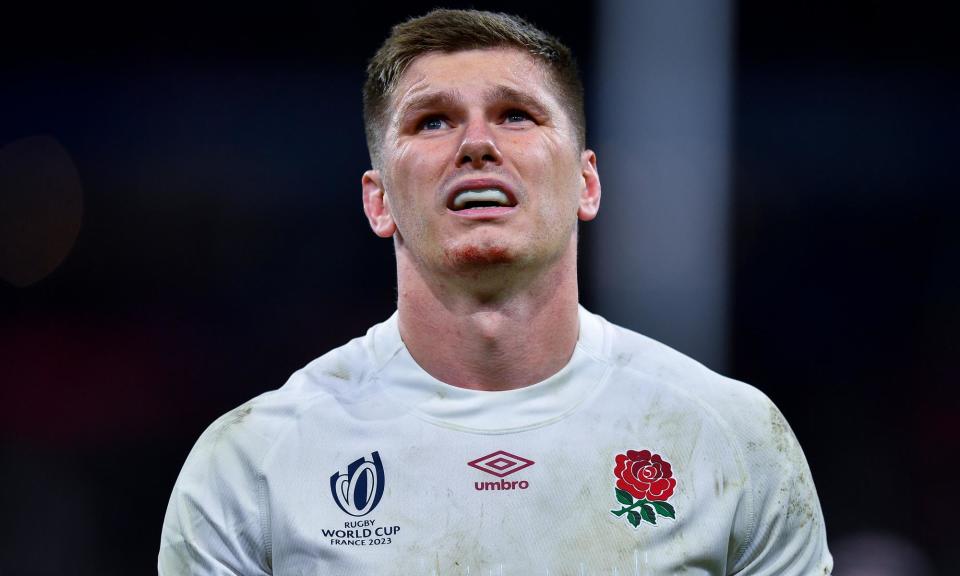England player welfare at heart of RFU’s enhanced ‘hybrid’ contract plan

The Rugby Football Union (RFU) has stressed the importance of improving its “wraparound care” for England internationals in the wake of Owen Farrell’s decision to make himself unavailable and a stark warning that other players are likely to follow suit.
Outlining details of the enhanced “hybrid” contracts set to be offered to up to 25 players as part of the RFU’s effort to relaunch professional rugby in England next season, the director of performance, Conor O’Shea, revealed the union is examining ways to be “best in class” at supporting its players.
Farrell has ruled himself out of contention for next year’s Six Nations, citing his mental wellbeing and that of his family, and it remains to be seen if he will play for his country again. Following that bombshell announcement, Kyle Sinckler predicted more England internationals would follow, adding: “I just think the support for the players, in general, if I am being blunt and brutally honest, could be a lot better. The support system could 100% [be better], from all over.”
Related: Owen Farrell’s England hiatus should give all of us pause for thought | Gerard Meagher
Farrell is still expected to be offered one of the hybrid contracts, which begin next season, and will enhance Steve Borthwick’s control over a core group of 25 players. Their club contracts will be supplemented by a fixed fee of about £160,000 per player from the RFU, enabling the England coach to have more of a say over things such as medical and conditioning programmes.
The 25 players make up an “enhanced elite player squad” and will have their individual development plans reviewed monthly. O’Shea said: “We just want to support [Owen] and all the time are looking to improve the wraparound care for players. That is the most important thing. It is getting more and more difficult and febrile to operate in some of these environments, so it is something we need to look at really carefully to make sure we are best in class when it comes to that.”
The enhanced contracts are the most significant aspect of the new professional game partnership (PGP) between the RFU and Premiership Rugby, which is set to be finalised in the new year before coming into force next summer.
Players will be offered enhanced contracts ranging from one to three years and, while Henry Arundell dealt the flagship scheme a blow by snubbing an offer in order to extend his stay with Racing 92, Maro Itoje and Jamie George are set to be the first senior England internationals to sign up.
O’Shea was at pains to stress that an enhanced contract does not guarantee England selection. The players, for their part, previously had the potential to earn more via the £23,000 England match fees – assuming they were fit and ever-present for the national side – but crucially the enhanced contracts provide security in the event of injury.
The group of 25 will sit inside a wider elite player squad of 50 – those without enhanced contracts will still receive one-off match fees if they play for England – while there will also be an “A” squad of 35, made up of the bottom end of the wider EPS and from recent under-20s graduates. England A play Portugal during next year’s Six Nations and the intention is to bring back regular fixtures for what was previously known as the Saxons side.
A remodelled second tier, in place of the Championship, is also a key part of the PGP. The RFU wants a revamped league of up to 14 sides, allowing for the returns of Wasps, London Irish and Worcester, and is set to launch a tender process early next year.
The current Championship clubs are invited to express their interest but have reservations over how much funding they would receive, the promotion and relegation mechanism to the Premiership and allowing three clubs that went bust to be fast-tracked back to the second tier.
“What we have said is that we believe it should be an expression of interest which is open to all, to make it the best and most sustainable league with the best teams,” said O’Shea. “[The Championship clubs] are saying that if there are additional teams, it should be first past the post and second past the post from the National Leagues. We’ve said we will wait, get the report back then decide what is best for the game.”

